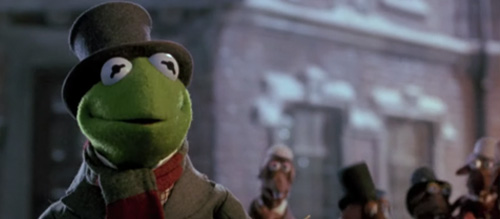‘The Muppet Christmas Carol’ at 30 – Review
The Muppet Christmas Carol (1992)
Director: Brian Henson
Screenwriter: Jerry Juhl
Starring: Michael Caine, Dave Goelz, Steve Whitmire, Jerry Nelson, Frank Oz, Steven Mackintosh, Meredith Braun, Robin Weaver, Raymond Coulthard
Even on its 30th birthday there remains a melancholic touch to the opening moments of The Muppet Christmas Carol. Its immediate dedication to Muppets creator Jim Henson and fellow performer Richard Hunt (the voice behind Scooter), each of whom had died before the film’s production in the January of 1992, has grown more bittersweet over the years in lieu of Disney’s complete takeover of the Muppets franchise (even owning the rights to the word “Muppet”). In witnessing these dedications in the current era, it is difficult to not think of the words of Jim Henson’s close friend and long-time collaborator Frank Oz, who in an interview with Hadley Freeman of The Guardian in 2021, said: “The Disney deal is probably what killed Jim. It made him sick.”
Disney only gained full ownership of The Muppets in 2004, but they had pursued the frog and pig show since the late 80s: according to Oz, Jim had expressed interest in selling the company so that he could focus more on creation as opposed to running a business. However, in getting into talks with Disney’s head at the time, Michael Eisner, a Pandora’s Box of greed swung open, with Disney’s intent being to buy ‘Sesame Street’, which Henson was vehemently against. Jim Henson died suddenly in 1990, not soon after the beginning of these talks. The cause: toxic shock syndrome from a streptococcal infection.
‘Sesame Street’ remains out of Disney’s grasp to this day (though it has sadly been messed around with by the HBO and Warner Bros. merger), but Disney has indeed massively benefitted from its Muppet purchase with their massive backlog of movies, TV specials and numerous episodes of ‘The Muppet Show’ fleshing out their Disney+ streaming service library. Of course, since its purchase, Disney have helmed their own Muppet productions with one of their latest series ‘Muppets Now’ being lauded as the Muppets renaissance; but Oz in the same interview doesn’t pull his punches with regards to this latest output. The original voice behind Fozzie Bear and Miss Piggy hasn’t worked on any Muppet productions since 2007 and believes there is a stark difference between the Henson and Disney era of the Muppets:
“The soul’s not there. The soul is what makes things grow and be funny. ”
Indeed The Muppet Christmas Carol finds itself in the middle of this claim – it is often revered as the hallmark of Muppet film productions and hasn’t been surpassed critically or in popularity since. Made in the shadow of his father’s passing, Brian Henson was the one in the director’s seat and (in accordance with Frank Oz’s claims) struggled with protecting his vision from the criticism of the Disney overseers. Thus, The Muppet Christmas Carol very much remains in the Henson era camp, and represents the importance of creativity and soul when it comes to creating truly memorable Muppets moments.
As it celebrates the big 3-0, now is the best time to examine how and why The Muppet Christmas Carol remains the perfect Muppet movie.
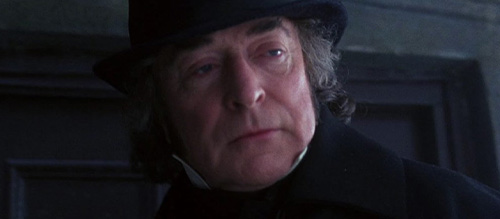
Charles Dickens’ 1843 novella “A Christmas Carol” is one of the most adapted works of English literature in history. It has featured prominently throughout the entirety of film and television, from the silent short films at the very beginning of Hollywood to a BBC and FX-collaborated mini-series starring Guy Pearce in 2019 and a number of feature releases in the 2020s. It truly is a timeless tale.
Recommended for you: A Christmas Carol Films Ranked
The story of a cruel and miserly money-lender’s reformation and redemption by learning the importance of kindness and generosity during yuletide – via a series of hauntings from the ghosts of Christmas’ past, present and future – has become as integral to telling the true Christmas message as the actual Nativity story. But, as Dickens’ festive tale has become so memorable that any Christmas lover could tell it as easily as describing the back of their own hand, how does one make a truly unique re-telling?
Frankly, the whole production of The Muppet Christmas Carol is nothing short of genius; the very idea of using Muppets to tell one of the greatest fables of all time is beautifully subversive. The creative team’s self-awareness of the Muppets’ association with goofy fun made the shattering of expectations of an asinine re-telling that much more brilliant. Of course, every opportunity to make a gag is taken and, despite this laugh-a-minute approach, the authenticity of the production team’s handling of the source material means The Muppet Christmas Carol certifies itself as one of the most evocative and dark film adaptions of them all. Consequentially, children are never pandered to but instead thrilled, leading them to be enthralled by re-watches as adults.
“Boy, that’s scary stuff! Should we be worried about the kids in the audience?”
“Nah, it’s all right. This is culture!”
The Muppet magic begins instantly as the opening credits present the Muppets themselves credited in the different roles (with Rizzo the Rat as Himself), alongside the correct listings of the human players, such as Michael Caine as Scrooge. This seamless blending of humans and Muppets, in not just the principle characters but also in the numerous extras, succeeds in the creation of a little world ripe to be immersed within. As such, both the zaniness of the Muppets and the seriousness of the humans are normalised, allowing for rapid but not jarring switches in tone.
The film’s MC is Gonzo the Great in the role of Charles Dickens, who is essentially the guide of the story through his narration. This is one of the key features that contributes to this adaption’s distinctiveness (and why it is also lauded as the best version); for by taking the story-teller approach there are no issues with exposition, so no awkward plot backflips are made to address key literary points. It also leads to greater authenticity, as the film is consequentially littered with direct quotes. There is no awkward out-of-time modern dialogue, just the atmospheric narration of one of England’s greatest wordsmiths.
Gonzo and Rizzo’s narration is largely responsible for the changing tone throughout the runtime, providing comic relief amongst the dark themes of the narrative. Unlike many modern children’s movies however, intense emotional moments are not ruined by unnecessary quips or sarcasm. The narrative vehicle complements sorrowful story beats, such as Gonzo comforting an upset Rizzo after witnessing a younger Scrooge lose the love of his life, and at times even completely stands back to let a heavy atmosphere breathe, such as in the sequence with the Ghost of Christmas Yet to Come in which both narrators are completely absent. Conversely, their continuing shenanigans in trailing behind Scrooge during his ghostly journey helps to entertain younger viewers who may not be able to understand the main storyline, thus consolidating its universal appeal.
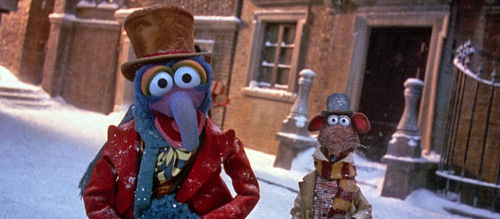
Gonzo and Rizzo being one of the main sources of the film’s comedy illustrates the intuitive casting of The Muppet Christmas Carol: human and Muppet. This is the first of the Muppets’ feature length movies in which the fuzzy puppets aren’t the narrative focus of the plot; the movie is more akin to ‘The Muppet Show’ in which the Muppets are the talented ensemble supporting the human guest star, and here they are used to their full potential. Many of the beloved Muppet characters have quite a short appearance (as many original puppets were necessary for the telling of this particular story), but they make their impact instantly, i.e Fozzie Bear’s simplistic optimism and Sam Eagle’s austere air (and his continuing American Patriotism even when trapped in a British novella).
Kermit the Frog has not only been the long-time straight man of the gang, but has also been the heart of most of the Muppet productions. The Muppet Christmas Carol is no exception. Here, our little green friend is cast in the role of Bob Cratchit, Ebenezer Scrooge’s underpaid clerk. If the magic of this film is to be summarised by one screen capture, it would be that of Bob Cratchit singing the last few notes of “One More Sleep ’til Christmas” whilst watching a shooting star fly past in the wintry cityscape. It is Kermit as Bob that steers the plot through its most poignant and saddest moments, soothing his family with wisdom relevant to those experiencing grief in real life.
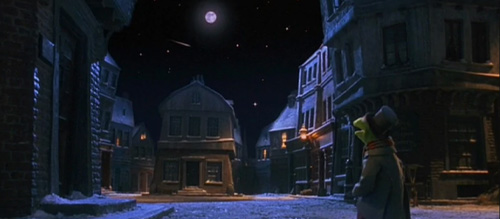
Additionally, it is Kermit as Bob Cratchit who embodies the true meaning of Christmas through his joy. The joy of being able to spend time with his family, to share in their excitement of sharing a simple meal (but one prepared with love), and to feel pride in his children, particularly for their developing kindness and empathy. Even the usually flamboyant Miss Piggy manages to bring an understated tenderness and domesticity to her role as Emily Cratchit, pairing with Kermit in moments of sadness and the joy of family life (although she does manage to fling an insult at Scrooge’s fashion taste). And yet, the most ingenious Muppet casting of the film is Kermit’s nephew Robin as Bob Cratchit’s son, Tiny Tim.
Dickens had the unfortunate habit of making some of his main sympathetic characters absolutely detestable through their unnervingly sweet nature (looking at you “Oliver Twist”), so any depiction of Tiny Tim tends to be in danger of being utterly despicable. Luckily, when your cast is made up mostly of Muppets, nearly all of the characters have some guaranteed charisma, and quite frankly Robin as Tiny Tim is nothing short of adorable, the undisputed cutest performance of all adaptions.
Bob and Tim’s performance in the “Christmas Scat” is endearing, charming and joyful. Even when Tiny Tim leads the family in a song of “Bless Us All”, Robin’s performance avoids a sanctimonious air and is instead convincing as having a genuine love for his family and of those around him (especially as he seconds his father’s choice to name Mr Scrooge the founder of the feast). In what could have been something overly pious, unrelatable and cringe, the music and lyrics are inclusive through a non-denominational approach, with the prayerful intentions heartfelt and simple: the hopes for a happy Christmas and a happy family.
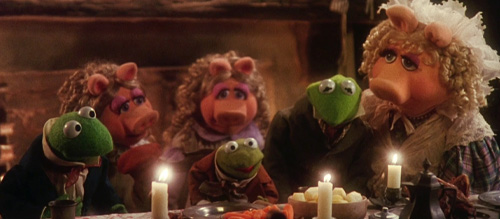
Credit must also be given to The Muppet Christmas Carol for portraying Tiny Tim as actually being sick: this lifts the adaption from clichéd disability inspiration into a fable of the injustice of poverty. Through his journey with The Ghost of Christmas Present, Scrooge is able to witness how his miserly ways and cruelty has a direct impact on the innocent people (and Muppets and creatures) around him. His wilful underpaying of his employees has threatened the health of innocent children and has potentially drastically shortened their life expectancy, and the guilt is etched all over Scrooge’s face. This represents the sincerity of this adaptation – Charles Dickens for all intents and purposes was the 19th Century equivalent of a modern-day social justice warrior who used his talents to channel his outrage over the poverty and mistreatment of the vulnerable throughout his society. In kind, The Muppet Christmas Carol makes every choice to give Dickens’ message as much impact as possible with no waste on dramatics and operatics.
The greatest shred of evidence of the production’s dedication to an authentic re-telling of Dickens’ story is the casting of Sir Michael Caine in the role of Ebenezer Scrooge. Michael Caine has admitted that he’d been dying to be a part of Muppet chaos since ‘The Muppet Show’ first aired in the 70s, which he was sadly never available to guest star on. As soon as he heard that a Muppets version of “A Christmas Carol” was in the works, he had his agent badger the production daily until he was offered an audition. He was duly offered the role that would become the most memorable to Sir Michael Caine himself, and would be the introduction to his incredible career for all generations that have been raised with this movie.
A common frustration with later Muppet features is the way human characters interact with The Muppets, often treating them as novelties or freaks, which can shatter the illusion. The same cannot be said of The Muppet Christmas Carol: Sir Michael Caine told director Brian Henson that he had the intention of acting as if he was doing a production for the Royal Shakespeare Company, which aligned precisely with what those behind the camera were reaching to achieve. A Scrooge acting as if it’s completely normal having a frog and rats work as his book-keeping staff is indeed the perfect recipe for top notch comedy. This is a key factor in the careful orchestration of this film’s tonal changes, allowing tension to be broken and giving young audiences a deeper insight into an often frightening story whilst providing them with raucously funny moments.

It is this sincere performance by Sir Michael Caine that carries most of the emotional weight of the movie and elevates Caine himself above other on-screen depictions of Scrooge. Many an actor’s version of Scrooge has been frozen into a curmudgeonly glower, particularly those offered by Albert Finney and Jim Carrey. In stark contrast, Michael Caine’s Scrooge is boasting the entire range, from cool derision to fiery rage and even a touch of gleeful sadism. Furthermore, his Scrooge lacks the initial twinkle in his eye that has often been employed in other adaptations, including Bill Murray’s and Kelsey Grammer’s; instead Caine employs the use of his iconic cold stare, the likes of which made him an unmissable movie star in violent films throughout the 70s and 80s, such as Get Carter. Michael Caine’s Scrooge is not only formidable but genuinely quite frightening, and therefore the progression of his character’s arc proves to be quite the wild ride as Caine’s performance through Scrooge’s tragedies and regrets is nothing short of incredibly moving. As Tiny Tim leads the Cratchit family in a round of “Bless Us All”, we melt as Scrooge melts; we see him fill up with guilt, regret, and even love and fondness – it’s etched all over his face. Scrooge’s redemption is not a case of us finding out what we knew all along, that Scrooge was a decent man deep down – Caine’s Scrooge is an actual transformation that had to win our sympathy through his moving experiences.
Thus it proves to be extremely frustrating that one of the most poignant scenes that provides significant backstory as to why Scrooge had become so cold is cut from the film. Meredith Braun as Scrooge’s fiancée Belle sings “When Love is Gone” when she ends her engagement with the young Scrooge as Caine looks on and shakily joins in with the last verse only to break down in tears. This scene was cut in the original theatrical release as Disney had thought it was too upsetting to younger audiences. It was subsequently included in the VHS version but was again excluded for the DVD, Blu Ray, television and streaming releases, much to the protest and dismay of those who grew up with the VHS version (especially at the news that the original master recording may have been lost, and especially as its exclusion leaves a jarring cut). Brian Henson revealed in 2020 that this version had been located and that the scene was hopefully going to be added back into later editions.
Ultimately, the cutting of this scene represents a lack of vision from Disney and supports their current reputation for preferring the least offensive and most lazy filmmaking, often coasting on the creativity of other innovators like Jim Henson, Stan Lee and George Lucas. When thoroughly examining the production choices of The Muppet Christmas Carol, it quickly becomes apparent that such powerful storytelling could never come from a boardroom, Disney or otherwise. The film’s message is not merely a reminder of being kind and generous during Christmas, it promotes the transforming power of kindness and preaches that the unfair hoarding of wealth is immoral, evil. Scrooge’s death in the Ghost of Christmas Yet to Come’s vision is portrayed as brining joy to the townsfolk; the song “Marley and Marley” explicitly states Scrooge’s late partner’s greed as the cause of their damned afterlife (doomed to drag around heavy chains for all eternity). It really is a song many of us would want some of the current world leaders and public figures to sit down and listen to.
As such, the creative team behind The Muppet Christmas Carol have become a part of the rallying cry that has continued for well over a century since Dickens’ death. It is a film in defence of the vulnerable in society and denounces the greed of the super-rich. This is something that the tax dodging and anti-LGBTQ+ lobbying suits of the Walt Disney Company could never meaningfully achieve.
Score: 22/24
Recommended for you: The Muppets Movies Ranked

